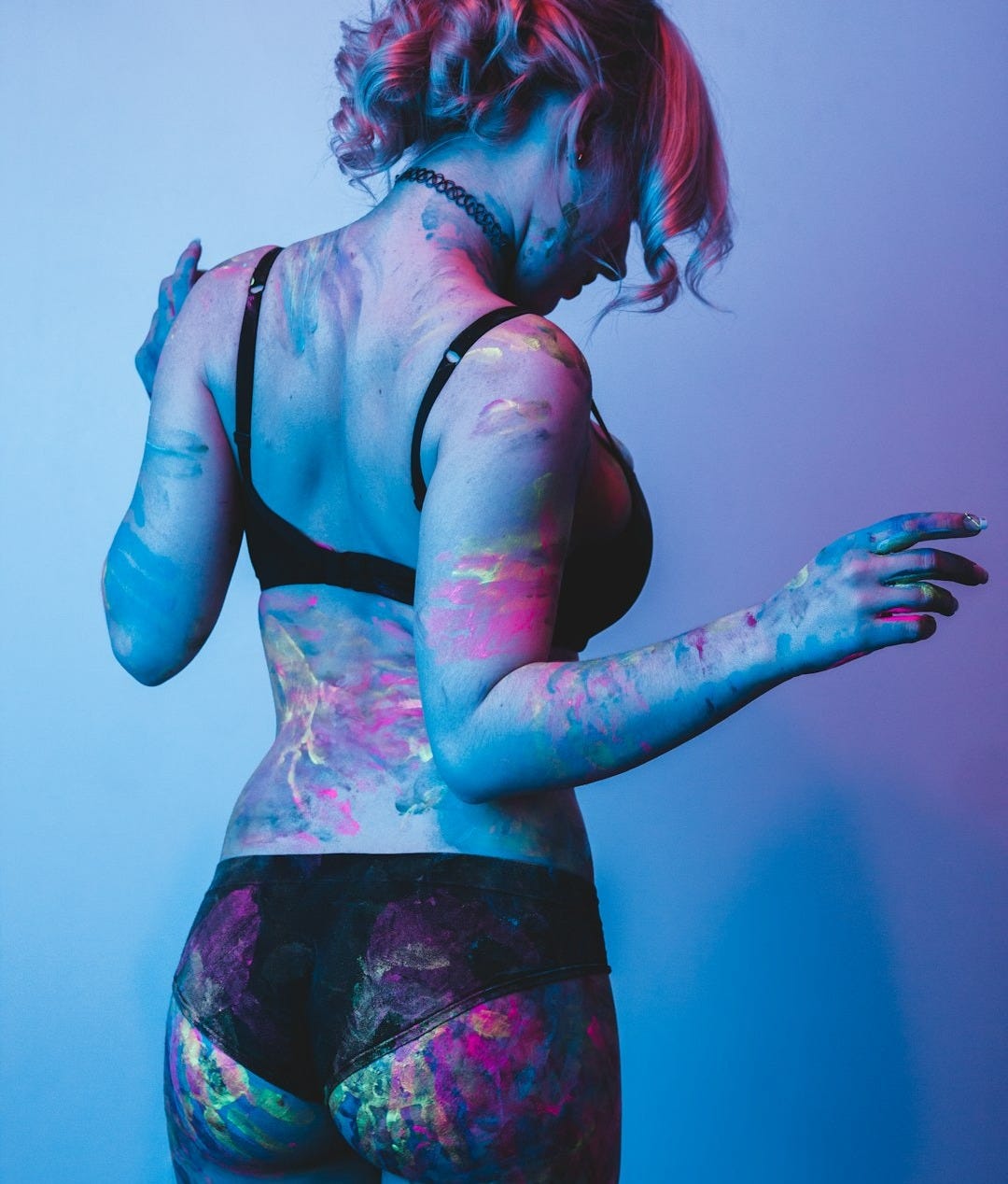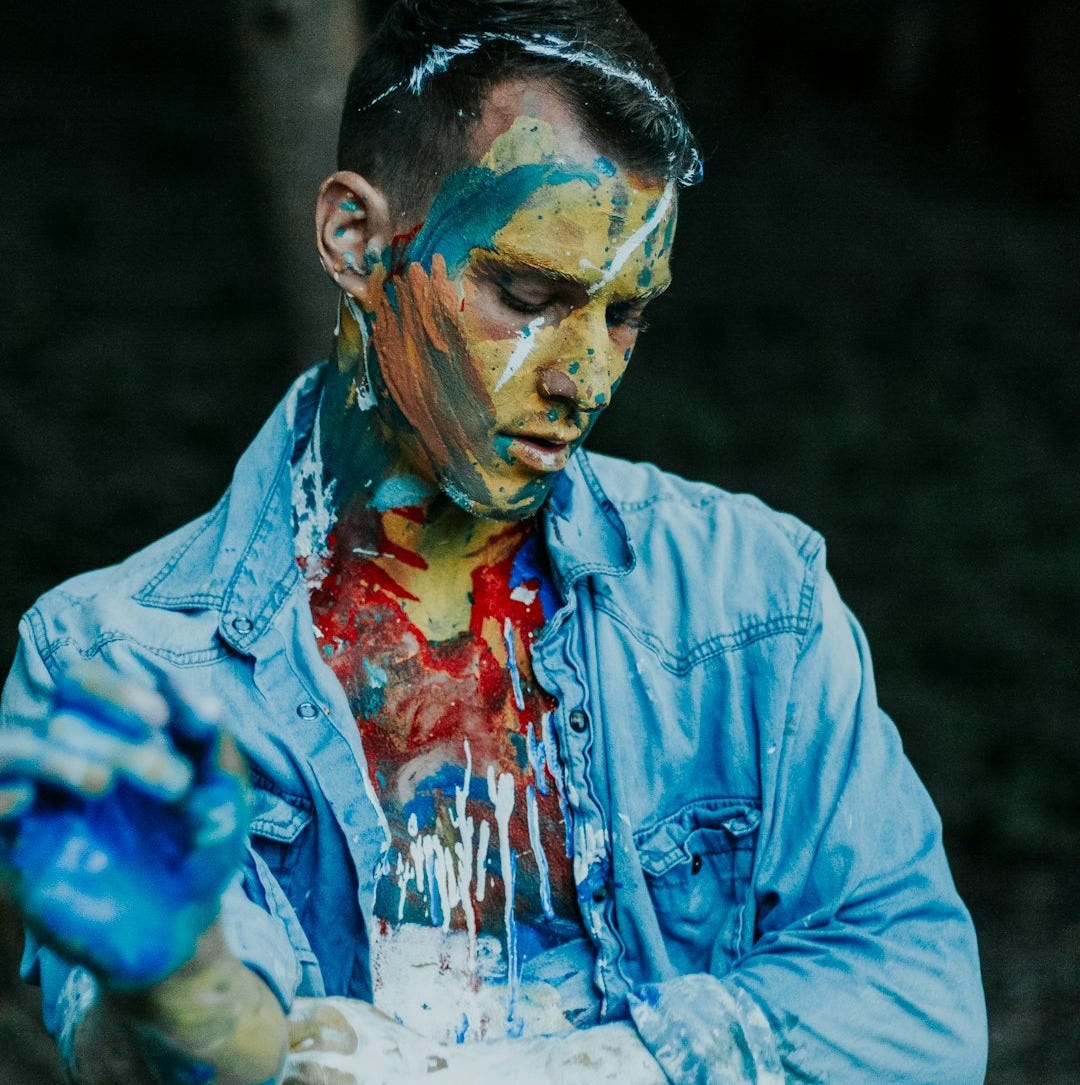Making art with your whole body
Your brain is not a separate entity
At some point in human history, we started to view our brains as the most important parts of us, and the rest of our bodies as slightly awkward and embarrassing transport for them.
Which is really weird, when you think about it. Why would we regard the vast majority of our physical entities as irrelevant and detached from the real us, and only focus on this one small area?
Hi my friend,
I’ve not always had the easiest relationship with my body. It hasn’t always done what I wanted it to do, it seems like it lets me down more often than I’d like. Plus, as a woman, I’ve been conditioned to see my body as something a bit disgusting, a bit dangerous, that needs to be controlled, contorted and hidden.
Even when our bodies create entire human beings out of nothing, we’re still told to view the process as gross, and to be “recovered from” as quickly as possible, rather than as magical and miraculous.
I wrote a while ago on my other publication about reconnecting to my body:
And yet our bodies are magical creative systems. They’re designed for creativity. Not just for making other people - humans have been making art since we arrived on the planet, and the earliest surviving piece of human art is a handprint. Our bodies both created and drove us to create tools, fire, shelter, clothing… and onwards to an entire civilisation.
The idea that our brain is where our logical thought and our sense of self resides is completely false. Western philosophers and the Christian church all had their own reasons for wanting us to distance ourselves from the physical and focus only on the esoteric, and their agenda is still driving a dualist approach to our identity. This view that our brains are us, and our bodies are just meat sacks carrying those brains around.

Here’s the thing, our brain is the processor that spits out thought in a conscious narrative that we can share with others. But the processing is done using inputs from all around our bodies. All our senses (and we have far more than five) transmit information from within and without, and feed that into our brain for it to make sense of.
The second highest concentration of neurons is in your gut - which is to say that when people say they know something in their gut, they’re not wrong. We’ve been taught to distrust and dismiss this knowing, but it’s powerful. Research shows that decisions that we believe we’ve taken rationally are most often taken on instinct - our gut tells us what to do, and the logical reasoning we put such faith in is employed simply to justify the decision we’ve already made.
So we have some work to do in relearning to trust our bodies. And, relatedly, in learning to better care for and support them. We’ve been taught to punish and starve and restrict our bodies, not to nurture them. But we can’t be our best selves or do our best work if we don’t show them some love.
Creativity, in particular, thrives when our bodies our rested, soothed and comfortable. When our senses are engaged, and we’re alert and present in the world. We need to engage with our environment to create, not disengage and retreat into our brains.
I wrote a super vulnerable piece last week on my other publication about reclaiming our physicality as part of reclaiming our connection to the natural world - in this post, I talked about sexuality, but our sexual drives and our creative impulses are not unconnected:
If we’re trying to deny any parts of ourselves - any needs, any aspect of our identity - then it’s impossible to create from a place of truth and authenticity. Which means it’s impossible to create anything meaningful or powerful.

In this society that tries to convince ourselves our bodies are shameful and in need of correction (so that they can sell us stuff to make those corrections), and that tries to distance us from a planet that it wants to use as a resource rather than respect as our home, it is a powerful act of rebellion to come back into ourselves. To be fully present in our bodies, to respect their natural states, and to honour their connection to the wider natural world.
Creativity is a wonderful way to heal that relationship with our bodies, if we allow it to be. The sensory nature of creativity, the act of making something from scratch, the connection it brings to ourselves and the world around us, can bring us back to the core of who we are.
We already know that creativity is an act of resistance, so if we allow ourselves to create from this space of rebellious embodiment, what a world we might be able to bring into being!
What does it mean to create in an embodied way?
If you’d like to introduce embodiment into your creative practice, you can find some tips for getting started in the Creative Fix Toolkit:
How to create in an embodied way
Contrary to what we’ve been led to believe, creativity does not live purely in the brain. You can read this piece to learn more about how your whole body is involved in ideation and creation:




